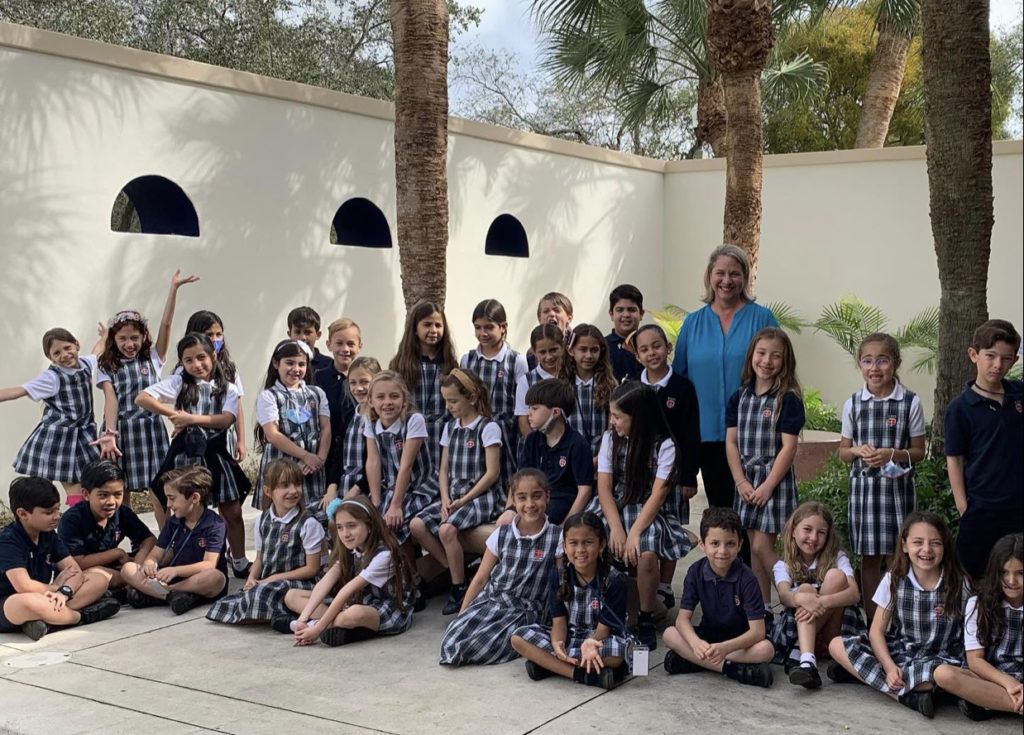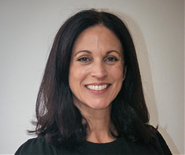Q&A with a Catholic school advocate who has returned to her roots
(reimaginED) – Catholic education has been an integral part of Cristina Rodriguez’s life. Her mother was a teacher in Cuba at a School of the Sacred Heart, an international network of private…

(reimaginED) – Catholic education has been an integral part of Cristina Rodriguez’s life. Her mother was a teacher in Cuba at a School of the Sacred Heart, an international network of private Catholic schools affiliated with the Society of the Sacred Heart, until she immigrated to Miami when the Cuban revolution began.
An alumna of the third graduating class of St. John Neumann Catholic School in Miami, Rodriguez graduated from the all-female Our Lady of Lourdes Academy before attending Florida International University, where she majored in elementary education and minored in early childhood education.
She earned a master’s degree in reading education during a five-year stint teaching kindergarten in a public school, then returned to St. John Neumann as media specialist. She was named principal at her alma mater last year.
In this reimaginED interview, Rodriguez talks about what inspired her to return to her roots and the changes that “our little school,” which now has 347 students and a robotics program, has gone through since she was a student there. She also outlines her goals as principal at St. John Neumann. Answers have been edited for clarity.

Cristina Rodriguez
Q. Who or what inspired you to pursue a career in education?
A. My inspiration to pursue a career in education was threefold. As a young girl, I always knew that I wanted to work with children to make an impact in their lives. I would say that was the driving force that led me to this career choice.
Another push toward education was my mother. She was an educator in Cuba, but unfortunately, her career was cut short in her early 20s with the invasion of Fidel Castro. My mother had to immigrate to the United States and take whatever job she could find to survive. During my childhood, she implemented many of the education strategies she had learned in her schooling and would speak fondly of her time as an educator in a Catholic school in Cuba.
This also inspired me to truly consider education as a career choice. But most important was the impact that St. John Neumann Elementary School and Our Lady of Lourdes High School had on my life as I matured into a young lady with a plethora of career choices before me. The gifts I received during my education at these two Catholic schools were invaluable. They truly imparted Catholic values as well as academic excellence, while demonstrating to me that I could do the same for future generations.
Q. Tell me about your experience at St. John Neumann Catholic School. What years did you attend? What was the style of teaching like and how does it compare to today?
A. I attended SJNCS from 1983 to 1988. At the time I attended, the teaching style was a bit more traditional, but it was rigorous. By the time I entered high school, I had already written two thesis papers, which is something most of my peers in ninth grade had not done yet.
Although SJNCS had a traditional teaching style at the time, it has always infused rigor and elements of innovation in its teaching style. Today, SJNCS has adjusted its style to follow suit with the current educational research by implementing a curriculum that will prepare students for the future workforce.
Education today needs to equip students with the skills that will allow them to take information and apply it in real-world situations. We want them to take the Gospel values and information being given to them to make decisions in their life or workforce. I do feel that SJNCS has never been afraid of making changes in its teaching styles. Our main goals have always been to provide an education that will prepare our students for the future while remaining steadfast in their Catholic identity.
Q. What kind of training did you receive as an education major at Florida International University? How did it prepare you for the classroom? How has it held up over time?
A. My training at FIU was a well-rounded and robust training. The education program provided the theoretical information, and we were able to put it into practice during our field hours and our student teaching. This was the case for both my bachelor’s in elementary education and my master’s in reading education.
Nothing prepares you for the classroom as the actual classroom does. Trial and error prepare you for what works and does not work in the classroom; education provides a toolbox full of tools that will help you once you are in the classroom.
A lot of the education I received at FIU has held up over time, but as educators, we are never done learning. As times change, technology changes, and our students change. We too need to continue our education in best practices to be equipped for those changes.
Q. You started your career in a district school. Aside from obvious things like attending Mass, was it different from your Catholic school experience as a student? If so, how?
A. I feel that my experience as a student in Catholic school was more well-rounded. In Catholic school, not only was my intelligence being nourished, but so was my soul. My faith was part of my school day every single day. I was challenged academically, physically, emotionally, and most importantly, spiritually.
Q. What made you want to leave the public-school setting?
A. During the early stages of my education and career, I thought I would have the most impact on the children in district schools. My first school was in a low socioeconomic area, and I felt that those students would need me the most, but something was missing for me.
I felt an intrinsic reward in making a difference for my students at the district school, but I felt I could do more in a Catholic school. In the Catholic school, not only would I be able to teach academics, but I would also be able to help my students encounter Jesus.
Q. You could easily have landed a job at any Catholic school. What made you want to return to the school you attended?
A. St. John Neumann is home to me. I always knew that I wanted to help current SJNCS students feel what I felt as a student back in the 1980s. It was important for me to give back and to minister at the school that gave me so much as a young student.
Q. What did you notice had changed when you returned to St. John Neumann?
A. The education was a little less traditional than when I was a student. But the core mission of the school was intact. Other than moving with current education trends that would benefit the students, it was still the same little school I graduated from in 1988.
Q. What innovations did you notice?
A. The students in the middle school who were a little more advanced had the option of taking honors courses in math and language arts. The school had built a media center and computer lab. Technology was now incorporated into the curriculum. I observed that the school was keeping up with current trends in education at that time. They did not remain stuck doing the same things they were doing when I was a student.
Q. When did you become principal and what attracted you to the position?
A. My role at SJNCS began as the media specialist and slowly morphed into that of development director. As my role shifted, I was given more administrative responsibilities. I was not looking to be a principal and was quite content with my current position until my principal announced her retirement.
She happened to be my teacher and assistant principal when I was a student at SJNCS and always encouraged me to consider the role of principal once I came back as a staff member. My name, among a few others, was thrown into the mix, but I think it was definitely God’s hand since all were qualified and amazing candidates.
I was not looking to move into this role by any means, but things aligned, and the next thing I knew my pastor was telling me that I was the next principal of SJNCS. Although I was a little hesitant, I knew that I wanted SJNCS to stay true to its mission and that I could help make that happen.
Q. What are you doing to make the school a better place for learning?
A. SJNCS has always been an amazing place for learning. My predecessors made sure of that! I am continuing what they began while making sure that we stay true to our mission of academic excellence that is rooted in Gospel values. I have an awesome leadership team that is helping me achieve this.
Q. What do you want your legacy to be?
A. I want my legacy to be that our students always remember SJNCS as a place where they were challenged academically, but most important, where they encountered Christ. I want them to feel that they were well-prepared for high school academically, but also spiritually, as I once did. I want them to remember that SJNCS will always be their home away from home, a home that helped them soar like an eagle.



